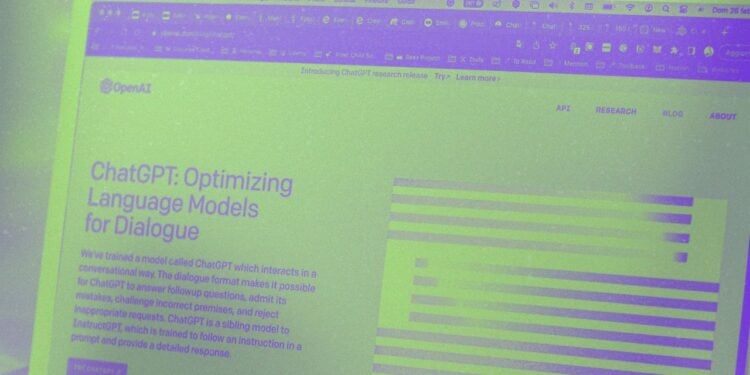- Understanding how to use AI gives you additional knowledge about various aspects of your business than your less-informed peers.
- 81% of surveyed professionals feel that AI will help them progress in their careers, whether by saving time, strengthening their networks, or changing the way they work.
- Knowing how to use the technology isn’t enough: to leverage your proficiencies to make a real career change, you’ll need to know how to market your skills.
In November of 2022, OpenAI reignited the conversation about artificial intelligence with the release of ChatGPT, the first large language model (LLM) widely accessible to the public.
In the following months, workers, employers, and journalists alike were awash with opinions on how the technology would change the world. Some claimed that AI would take countless jobs and others felt the importance of the technology was overblown.
Somewhere between these two sentiments lies working individuals who understand that new technology brings new opportunities. AI is no different.
We’re already seeing a massive increase in job listings searching for candidates proficient with AI, and this trend shows little signs of slowing down. Regardless of your personal feelings on new technology or how applicable you think this technology is, learning how to utilize AI tools is a much better use of your time than ignoring these updates.
Understanding how to use this technology could advance your career dramatically, helping you land promotions, and ultimately, improve your earning potential.
Stand out among your peers
Because AI has proven to be an incredibly polarizing topic, workers are in a unique position to learn skills and techniques that will actionably improve their employability and earning potential without much competition from their peers.
Not to mention, usable AI and publicly available large language models are fairly new, so even if you’re working in an environment where everyone’s excited about AI, you’re not far behind anyone else and can quickly become just as proficient as they are.
Many individuals get caught up in their personal feelings toward AI and it becomes a barrier that prevents them from utilizing the information they’re provided with.
Remember, you don’t have to like AI, you don’t have to understand the specific situations where AI will change the world, nor do you have to enjoy using the technology. More importantly than anything, you have to familiarize yourself with the tools you have access to and attempt to understand as much as possible about artificial intelligence and its various applications.
As with many emerging industries, the playing field is heavily saturated with individuals who speak loudly and know little. By taking the time and expending the effort required to genuinely understand how AI works, situations in which you can utilize LLMs to save time or money, and keep up to date with new developments, you will quickly rise to the top percentile of workers who claim to be proficient with AI.
Solely by the merit of understanding this new technology and speaking with authority about what may be next, you will be better suited than most to catch your superiors’ attention.
Professionals expect AI to change their careers
Despite some differing feelings on the technology, most professionals haven’t deluded themselves into thinking AI won’t be impactful.
During the pandemic, the United States saw almost 9 million occupational shifts, 50% more than the previous three-year stretch.
Now, McKinsey Global claims that the United States is due for 12 million more occupational shifts by the year 2030. Unsurprisingly, automation and AI tools account for a sizable percentage of the expected shifts.
Not only will becoming proficient with AI help you land better job opportunities now, but it will also prepare you for an environment that relies heavily upon AI in the future.
Leveraging AI proficiency
Unfortunately, simply knowing how to use AI is often not enough to land a new promotion or career. With the sheer number of individuals around who claim to have some kind of proficiency with AI, talk is very cheap.
This means that if you want to be rewarded for your efforts, you’ll need to take the steps required to show your superiors and potential employers just how much you know about AI.
Writing “prompt engineer” on your resume may give your CV more attention than other applicants, but it’s not enough to truly stick out to recruiters and HR departments. Instead, showcase the work you’ve done with AI. If you’ve used ChatGPT to build websites, applications, or other projects, show them off.
The more work you can show, the better. If you’re in a position where you aren’t looking for a new position but are hoping for a promotion in your current job, make sure that you show your superiors the work you’re doing. The key is to not be ashamed that you’re using AI. Don’t be tempted to hide that you’re using AI to complete the projects; showcase how beneficial it is, that it’s saving you time, increasing your productivity, adding depth, etc.
Additionally, you may consider finding different ways to implement AI tools or software into your business and bringing these ideas to your superior to reduce costs and labor. Once they’ve seen how well AI tools are supporting your work, it’s much more likely leadership will let you spearhead implementation on a larger scale — possibly as a new manager.
The way you use AI to land new promotions or careers is by actively using the technology in creative and exciting implementations, and using these projects to convince your superiors or new recruiters that you aren’t someone who just talks about using AI but instead are comfortable using it.



 Dr. Gleb Tsipursky – The Office Whisperer
Dr. Gleb Tsipursky – The Office Whisperer Nirit Cohen – WorkFutures
Nirit Cohen – WorkFutures Angela Howard – Culture Expert
Angela Howard – Culture Expert Drew Jones – Design & Innovation
Drew Jones – Design & Innovation Jonathan Price – CRE & Flex Expert
Jonathan Price – CRE & Flex Expert













